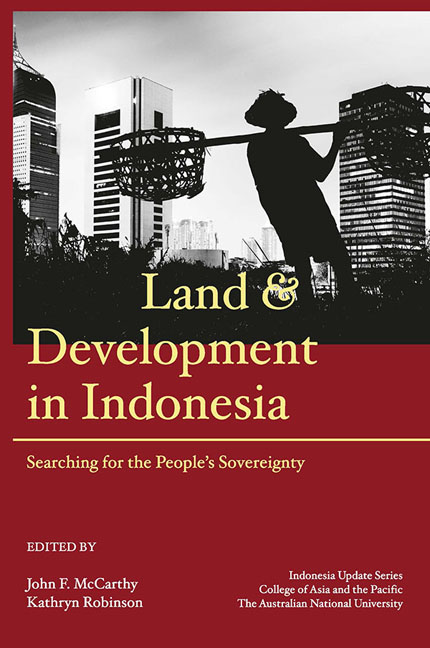Book contents
- Frontmatter
- Contents
- Tables
- Figures
- Contributors
- Acknowledgements
- Glossary
- Map
- 1 Land, economic development, social justice and environmental management in Indonesia: the search for the people's sovereignty
- PART 1 LAND USE AND LAND LAW: THE BIG PICTURE
- PART 2 ENVIRONMENTAL AND CUSTOMARY FRAMING OF LAND TENURE
- 4 Emerging options for the recognition and protection of indigenous community rights in Indonesia
- 5 REDD, land management and the politics of forest and land tenure reform with special reference to the case of Central Kalimantan province
- 6 Mining, land and community rights in Indonesia
- PART 3 URBAN AND INFRASTRUCTURE DEVELOPMENT
- PART 4 AGRICULTURE, LAND TENURE AND LIVELIHOODS
- PART 5 LARGE-SCALE LAND ACQUISITIONS AND SMALLHOLDER DEVELOPMENT
- Index
- Miscellaneous Endmatter
6 - Mining, land and community rights in Indonesia
from PART 2 - ENVIRONMENTAL AND CUSTOMARY FRAMING OF LAND TENURE
Published online by Cambridge University Press: 29 July 2017
- Frontmatter
- Contents
- Tables
- Figures
- Contributors
- Acknowledgements
- Glossary
- Map
- 1 Land, economic development, social justice and environmental management in Indonesia: the search for the people's sovereignty
- PART 1 LAND USE AND LAND LAW: THE BIG PICTURE
- PART 2 ENVIRONMENTAL AND CUSTOMARY FRAMING OF LAND TENURE
- 4 Emerging options for the recognition and protection of indigenous community rights in Indonesia
- 5 REDD, land management and the politics of forest and land tenure reform with special reference to the case of Central Kalimantan province
- 6 Mining, land and community rights in Indonesia
- PART 3 URBAN AND INFRASTRUCTURE DEVELOPMENT
- PART 4 AGRICULTURE, LAND TENURE AND LIVELIHOODS
- PART 5 LARGE-SCALE LAND ACQUISITIONS AND SMALLHOLDER DEVELOPMENT
- Index
- Miscellaneous Endmatter
Summary
Indonesia's immense mineral reserves (tin, nickel, gold, copper and also coal) hold out the promise of economic development for people in many of Indonesia's poor and remote regions. Exploitation of the nation's mineral wealth for the global market began slowly in the colonial period but Indonesia is now ‘a key mineral supplier to the global market’ with mining contributing around 5 per cent of GDP (Devi and Prayogo 2013: 6). According to the Mining Advocacy Network (Jaringan Advokasi Tambang, JATAM), around 44 per cent of Indonesia's land is currently subject to mining, oil and gas concessions (Siregar 2015), involving both privately owned and state-owned companies and both national and international investors.
Indonesia's mineral deposits tend to be found on land used for generations by rural populations for livelihoods—farming, forest product collection, even small-scale mining—and/or zoned by the state for forest protection (Resosodarmo et al. 2014). These are often marginal peoples, and although they may have developed systems of property rights over the centuries, they usually lack formal, state-recognised title to their land. Disputes over land use and (non-)recognition of land rights have been a distinctive feature of projects to exploit Indonesia's rich mineral resources. As noted elsewhere in this volume (Chapter 3 by Bedner, Chapter 13 by Afrizal and Anderson, Chapter 14 by Potter), much of the conflict over land has its roots in the lack of clarity, or lack of enforce ment, of the legal instruments that permit mining, including regulation of the entry of foreign miners. In other words, disputes over access to and use of the land and its mineral resources are also disagreements over the meaning or the enforcement of laws.
This chapter begins by providing an account of the historical questions of popular sovereignty posed by the mining sector. First, it considers the Suharto period when, in the name of national development, the regime allowed investors to ignore the land rights of local people and indigenous communities inhabiting the lands that were subject to Contracts of Work (Kontrak Karya) with foreign mining companies. This led to a large number of disputes with communities whose lands had been forcibly taken for investment projects, laying the ground for the emergence of indigenous rights groups and indigenous umbrella organisations during the late Suharto and reform (reformasi) periods.
- Type
- Chapter
- Information
- Land and Development in IndonesiaSearching for the People's Sovereignty, pp. 141 - 164Publisher: ISEAS–Yusof Ishak InstitutePrint publication year: 2016



